When in Munich...
/I was delighted to have been invited over to Munich at the weekend to give a workshop / seminar for Community Music Muenchen, the emerging group of practitioners, cultural workers, activists and academics which Alicia Banffy initiated as part of her doctoral Action Research into the CM community in Munich. I first met some of the group in 2015, when I gave a paper at the academic conference that Alicia and Prof. Burkhard Hill had set up to discuss CM in Munich at Ludwig Maximillian University. In the time since the conference, they've both been incredibly hard at work turning some of the content of the conference into Germany’s first real academic text on Community Music. I'm very proud to have a chapter in it, where I suggest Ranciere’s conceptual frame of ‘dissensus’ as an antidote to the many failed attempts to define CM in more simple terms, based on my experiences in Caceres in southern Spain a few years, surrounded by flamenco dancers, singing nuns, and wildly expressive ‘idiot’ dancing. The chapter has obviously been translated into German for the book’s intended audience, but you can read an English translation here.
I loved giving the workshop, and can't thank Alicia, Kitty Von Korff, Marie Karaisal and Matthias Fischer enough for the opportunity to bring my ideas and my practice to the rather excellent assemblage of musicians, music therapists, social workers, teachers and students who attended. It's quite remarkable how much traction Alicia has managed to get with CM in Munich that in a matter of a few short months there could such an enthusiastic and talented group of 35 or so practitioners, all keen to develop their skills and knowledge.
It felt really appropriate that I was able to deliver the day as a ‘praxis’, combining my ‘music in three dimensions’ theory with a practical exploration of it as a walking meditation, and also exploring the ‘pillars of groove’ approach I use for facilitating participatory improvisation. On the flight over, I'd read Alexandra Kertz-Welzel’s rather fierce critique of CM in the Philosophy of Music Education Review, and was drafting a response, although some of the points she makes are, I think, quite valid. Unless musicians who practice CM are prepared and willing to develop their practice into praxis through study, we face two significant risks as a field. One is that we lay ourselves open to accusations of ‘anti-intellectualism’ which doesn't help us occupy a position of strength within the academy, which is where we need to be if we are to influence and inform the knowledge capital of music and music education. Secondly, it means vacating such positions to academic researchers at one (or more) step/s removed from the field of practice, which will in turn lead to more rigid boundaries between theory and practice, and a diminution of the voices and experiences of practitioners in knowledge terms. And we don't want that, do we?
Reflecting on one’s practice is essential to keeping it fresh, and I came away from the weekend feeling very confident that the dialogues we had started together would make a positive contribution to everyone’s praxis, mine included. Understanding what CM means in cultural terms in Germany is an excellent way of reflecting on what it means for me in the UK. It also really reminded me that CM is a truly international movement, whose membership is growing, broadening and strengthening all the time. Lee Higgins from the International Centre for Community Music was also at the book launch, and really helped to contextualise the German experience in the context of CM’s burgeoning presence world-wide. The eagerly-anticipated OUP Handbook of Community Music (which Katherine Zeserson and I also have a chapter in) is due out later this year, and its publication will be a timely marker of the growth of the CM movement across the globe.
I’m glad to be back on Northern soil now, but much refreshed by my trip to Munich, and the excellent and inspiring community of people there who made me so welcome. Thank you x
